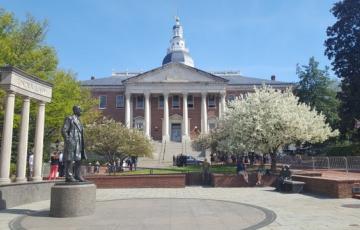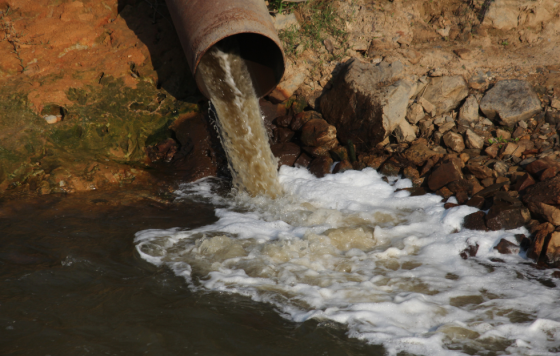Another year, another legislative session complete for us in Maryland! Maryland’s legislative session runs for just 90 days each year, between January and April, and ended this year on Monday 4/11. It was a busy legislative session full of lots of action on clean water, clean air, and environmental justice - and Clean Water Action members like you sent 3,000 emails to your delegates and senators in support of our priority legislation. Thank you for everything you do!
Here’s how our top clean water priorities fared:
Septic Systems
Septic systems play an important role in protecting water quality, public health, and home values. Unfortunately, Maryland's approach to regulating them has created a situation where problematic systems fail, fixes are financially out of reach, and consumers (and the environment) are left to suffer the consequences. For years, we’ve been working with a team of stakeholders on a suite of bills to improve the state of septic systems in Maryland.
- HB318/S479, from Delegate Stein and Senator Hester, creates a regulatory board within the Maryland Department of the Environment to license and regulate the industry. After four years of working with various stakeholders on this concept, we’re thrilled to see this legislation pass! Read our testimony here.
Composting and Zero Waste
We’ve been working for years to shift Maryland away from trash incineration, and one of the biggest climate champions in the waste sector is compost! A new report this month says that composting organic waste alone could cut methane emissions from solid waste by 78% by 2030. Here’s how three big bills on composting fared this year:
- HB150/SB124, from Delegate Charkoudian and Senator Hettleman, creates a state grant program for local schools and school systems to reduce wasted food, and compost what remains! This program builds on the successful volunteer-driven compost programs in schools all across Maryland, from Frederick to Ocean City. This bill passed, but without funding for the program; instead, it gives the state government and local school systems the opportunity to collaborate in seeking out federal funding. We’re glad to see the program moving forward, but disappointed the state did not invest in it this year; we’ll keep working to support school composting in the years ahead! Read our testimony here.
- HB566, from Delegate Boyce, required that newly-constructed schools be designed with sorting and separating trash in mind. In the schools that have started compost and waste diversion programs, the infrastructure has been made ad-hoc; dedicated, well-designed infrastructure will make a big difference. This bill passed with flying colors, unanimously in the Senate! Read our testimony here.
- HB0184/SB0229, from Delegate Shetty and Senator Gallion, would have allowed farmers to compost more food waste on their farms. Right now, farmers can use up to 40,000 square feet to compost waste generated on their farm and manure from off their farm, but if they want to incorporate food waste, they are restricted to 5,000 square feet. This bill would have simply put food scraps on the same 40,000-square-foot playing field as on-farm waste and manure, allowing farmers to incorporate food scraps into their existing compost operations: good for the farmer, and good for our communities. This bill passed the Senate unanimously, but was held up in the House - we’ll be back at it again next year. Read our testimony here.
Mid-Atlantic Environmental Justice Priorities:
We’re proud to serve as Maryland co-anchors of the Mid-Atlantic Justice Coalition, working to advance environmental and economic justice priorities in Maryland and our neighboring states. The coalition selected three legislative priorities this year:
-
HB141/SB23, from Delegate Ruth and Senator Carter, is the Transportation Equity Act, proactively enforcing Civil Rights Act Title VI protections in Maryland and ensuring that decisions made by the Maryland Department of Transportation are equitable. Although the bill was heavily amended, we are thrilled that the core elements of the Transportation Equity Act passed - with bipartisan support! Read our testimony here.
- HB11, from Delegate Stewart, is the Reclaim Renewable Energy Act. For years, we’ve been working with communities impacted by trash incineration to delete incineration from Maryland’s Renewable Portfolio Standard, where it’s been subsidized with money meant for wind, solar, and truly renewable energy. This year, we expanded the coalition to include allies fighting against factory farm “biogas” (methane manufacturing) on the Eastern Shore, and the expanded Reclaim Renewable Energy Act deleted every greenhouse-gas-emitting energy source from the Renewable Portfolio Standard. The legislation did not move forward this year, but we know we’ll keep fighting for a pollution-free Renewable Portfolio Standard. Read our testimony here.
- HB1033, from Delegate Rosenberg, applied the Justice 40 principles of the Biden Administration to Maryland. It mandates that 40% of spending in key areas related to environmental justice - housing, health, environmental remediation, and climate resiliency - go to low-income communities already overburdened by pollution. It also leaned on the expertise of the Center for Community Engagement, Environmental Justice, and Health at UMD to proactively create definitions for overburdened and low-income communities. The bill did not move forward this year, but its definitions were included in other environmental justice bills, including Climate Solutions Now which has passed, and its principles were noted and applied in the state budget. We’ll be working to advance frontline community priorities with the coalition in the years to come. Read our testimony here.
Climate Action
To help the Climate Solutions Now Act over the finish line, our canvass gathered postcards from Marylanders to ask the General Assembly, and then Governor Hogan, to pass this important climate bill to steer Maryland toward the right track. The bill passed the legislature and then went into law without Governor Hogan’s signature this weekend.
Make a Gift Today!
We made a lot of progress in 2022, and we’ve got a lot more work to do. We can’t do it without you! Please click here to support our work in Maryland, and keep an eye out for more ways to support clean water at your city or county level this year!



